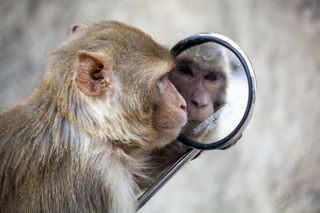Animals
Explore Animals
Editor's Picks
Latest about Animals

120 million-year-old birds tracks near South Pole are the oldest ever discovered in the Southern Hemisphere
By Carys Matthews published
Fossilized bird tracks discovered in Australia show these ancient creatures lived in the southern polar regions on the supercontinent of Gondwana.

Here's what happens when cats get too fat (it involves acidic poop)
By Jennifer Nalewicki published
Obesity is wreaking havoc on cats' digestive systems, causing "significant changes" in their gut microbial compositions and giving them highly acidic poop.

Watch a super-rare dreamer anglerfish with ultra-black 'invisibility cloak' swim like a shadow in the deep sea
By Harry Baker published
MBARI researchers came across a rarely seen dreamer anglerfish off California's coast. Video footage of the alien-looking fish only shows its silhouette because its skin is so dark it absorbs almost all of the light that hits it.

Crabs keep evolving to go from the sea to the land — and back again
By Carys Matthews published
True crabs evolved to migrate between marine and land environments multiple times throughout their 250 million-year-old history, new study finds.

'It's really quite remarkable': An interview with elephant expert Ross MacPhee about the giant pachyderms
By Laura Geggel published
In this interview, elephant expert Ross MacPhee explains how the giant animals' tusks record every week of their lives and why their noses are so remarkable.

Dwarf elephants and shedding mammoths shine at NYC's 'Secret World of Elephants'
By Laura Geggel published
A new show on "The Secret World of Elephants" at the American Museum of Natural History in New York City dishes on the evolution and remarkable lives of these huge (and sometimes dwarf) pachyderms.

Elephants give each other names — the 1st non-human animals to do so, study claims
By Richard Pallardy published
Elephants in Kenya's Amboseli National Park appear to call to each other with individual names using low, complex "rumbles," a study has found.

'[He] attempted to study fertilization in frogs by fitting the males with tiny trousers': The science of sperm in the 1700s
By Philip Ball published
Spallanzani has been described as having a "lust for knowledge": a passion that sometimes seemed to exceed propriety, as when he was said to have begun expounding enthusiastically to a group of dignitaries about the mating of frogs.
Live Science newsletter
Stay up to date on the latest science news by signing up for our Essentials newsletter.

